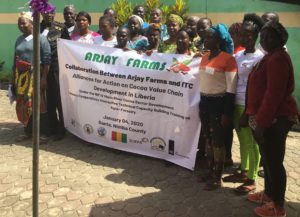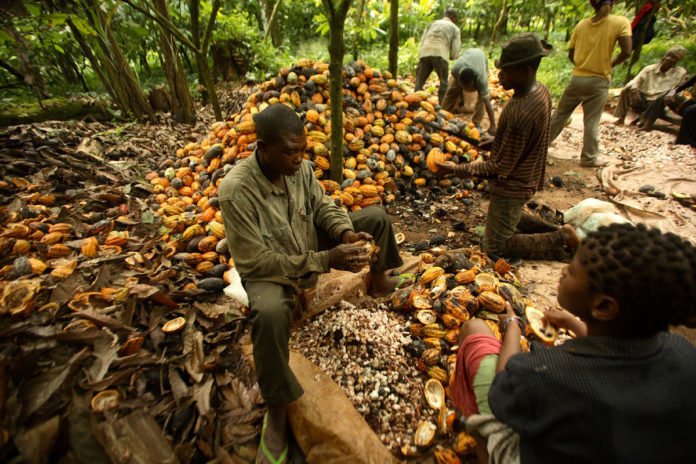By Joseph O. Sayon|Environmental Contributor
The cocoa sector remains somehow a struggling place due to the lack of knowledge by many farmers in in Liberia since the end of the country’s deadly civil conflict.
Many cocoa farmers here have little or sometimes no knowledge to prevent their cocoa from diseases such as Black Pod Disease, Mirid from destroying their cocoa.
The Liberian farmers living mainly in the rural areas sometimes get little cocoa yield after harvest as a result of these diseases.
This is also making it difficult for Liberian cocoa farmers to attract the international market due to the low grade of cocoa they produce.
Experts in the cocoa sector say one way to improve the quality of cocoa farmers produce from Liberia is to train them how to maintain the cocoa for high quality yield.
To ease the farmers’ effort going in vain, Arjay Farms completed a one day technical capacity building training on cocoa value chain development in Liberia.
The training was organized by Arjay Farm in Kingsville #7 lower Montserrado County, in collaboration with Geneva based International Trade Centre with support from the government of Netherlands.
Addressing the farmers over the weekend on January 4, 2020, Arjay Farm, Chief Executive Officer, Josephine Francis said her Farm with not only build the capacity of the farmers, but will also give them technical assistance.
As part of the technical assistance, Madam Francis said Arjay farm will give clean cocoa seeds to the farmers for planting.
The Arjay boss assured that her farm will work along with the farmers through their respective cooperative to clear and plant at least one acre of farmland with the seeds given them.
She noted that the project will mainly focus on women and encourage them to take ownership of program.
According to her the project will introduce and promote ‘agro-forestry’ to enhance climate smart agriculture in the cocoa sector of the Country.
The new project is to create program where cocoa will be planted alongside with other cash crops including cassava, yarn, okra, amongst others.
If implemented well by the farmers, the project would take them out of poverty and add value to Liberian cocoa both locally and internationally.
Liberia is still struggling to produce cocoa in abundance for international market like neighboring Ivory Coast and Ghana.
“The time has come, for cocoa farmers in Liberia to take step that will ensure that they sell their cocoa in Europe or the United States without any middleman take charge”, madam Francis insisted.
She expressed hope that one day Liberian cooperatives will take their cocoa to Europe or USA as a means of competing with others in the sub-region.
The move by Arjay Farms was however welcomed by cocoa farmers in Liberia and pledged their commitment to uphold the true intent of the project.

They believed that the new method of agro-forestry introduced by Arjay Farm in collaboration with the International Trade Centre is a big boost to the cocoa sector of Liberia.
Meanwhile, cocoa farmers benefiting from the project have begun clearing their respective portions of their project sites in anticipation to plant seedlings that will be given to them.
The project is being implemented under the Mano River cocoa technical capacity building training on cocoa value chain development.
More smiles for cocoa farmers
In 2019, a financing agreement for the Tree Crops Extension Project II (TCEP II) was signed by correspondence by Gilbert F. Houngbo, President of IFAD and Samuel D. Tweah, Jr., Minister of Finance and Development Planning of the Republic of Liberia for farmers.
About 10,000 cocoa smallholder producers in Liberia are also expected to benefit from this new funding in a tune of $47.6 million project that aims to improve their food and nutrition security and raise their incomes by modernizing cocoa farming, increasing production and developing markets.























Comments are closed.